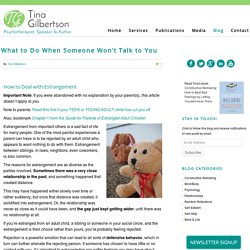

Whatever Happened to Respecting Your Parents? Source: Jupiterimages/Photo Images Inside the Reconnection Club, my online school for parents of estranged adult children, a member recently posted this comment: “As a Baby Boomer I was raised to respect our elders.

Now I hear ‘Respect has to be earned’.” article continues after advertisement I often hear variations on that lament from estranged parents, and understandably so. It’s especially confusing when we realize that, in reality, respect has always had to be earned. The question of respecting parents (“Honor thy father and thy mother,” in Biblical terms) arises in part because of the ever-present confusion in our society between behavior and emotion.
Is respect something we do? The Appearance of Respect It may or may not be obvious that respect can be both an action and a feeling. In the past, we demonstrated respect for adults through language like “sir” and “ma’am.” But respect, as a feeling, has always been earned. My (Adult) Child, Myself. Source: Creatas/Photo Images Has your adult child ever accused you of being too critical?

Not supportive enough? What about intrusive, or needy? One way to handle complaints like this is to assume that your child is overly sensitive. There is such a thing as high sensitivity, which can exacerbate any problems between parents and adult children – and sometimes even lead to estrangement. article continues after advertisement But imagine approaching your child’s feedback as if it were a mirror. It makes sense. On the upside, a self-confident, ambitious mom will encourage her adult child to start the shoot-for-the-stars business venture he’s been talking about. When the child says, “Thank you for supporting me in trying this new thing,” he’s also holding up a mirror that says, “You’re not afraid to try new things.” The Best Approach to an Unsolvable Problem. Source: Urilux/Photo Images A serious health challenge.

A stressful job that can’t be quit. A relationship that’s as painful as it is loving. Life serves up many problems with either no solution or only imperfect solutions that seem either just as bad or worse than the problem itself. article continues after advertisement What do you do when someone you care about faces a problem like this? We are far more than just solution-generation machines. How to Validate Someone (Or Yourself) As a therapist, I’ve sat with many people over the years struggling with substantial problems with no good solutions. I’m always struck by how much lighter people feel when they hear, “This is a difficult problem. Unhappy? Maybe You Should Be. Source: Martinan / 123RF Stock Photo If you’re blue, there’s a reason.

What’s going on in your life right now? Are you feeling alone in a relationship with someone else? Is your job draining or dull? Do you walk around all day with an inner critic whispering in your ear? “Unhappy” is not the same as “depressed.” People with severe depression can benefit substantially from medication, but too many of us who are merely unhappy end up reaching for a quick fix instead of exploring ways to actively change whatever isn’t going well for us. Unhappiness is a clue. It invites us to comb through our lives for potential areas of improvement. If any of those aren’t fulfilling, we’re supposed to be unhappy about it.
8 Things Never to Say in a Text. Source: pathdoc/Shutterstock Have you ever sent a text you wished you could take back?

Or have you ever received a text that confused you, hurt you, or made you angry? If you have, you may understand how texting can be a risky framework for building relationships. Face-to-face is where relationships live and thrive, so, as a rule of thumb, try to save the important stuff for face-to-face conversations. Here are eight specific things to avoid when texting: 1. What Makes Someone an A-hole? 8 Things You Have the Right to Expect From Your Partner. How to Finally End Up With the Right Partner. 3 Essential Ways to Protect Your Personal Boundaries. The Real Reason We Over-Think Relationships.
What to Do When Someone Won't Talk to You - Tina Gilbertson. How to Deal with Estrangement Also, bookmark Chapter 1 from the Guide for Parents of Estranged Adult Children Estrangement from important others is a sad fact of life for many people.

One of the most painful experiences a parent can have is to be rejected by an adult child who appears to want nothing to do with them. Estrangement between siblings, in-laws, neighbors, even coworkers, is also common. The reasons for estrangement are as diverse as the parties involved. This may have happened either slowly over time or rather suddenly, but once that distance was created, it solidified into estrangement. If you’re estranged from an adult child, a sibling or someone in your social circle, and the estrangement is their choice rather than yours, you’re probably feeling rejected. Rejection is a powerful emotion that can lead to all sorts of defensive behavior, which in turn can further alienate the rejecting person. Often when we’re hurt we resort to anger, resentment or vengefulness. 1. 2. 3. 4.